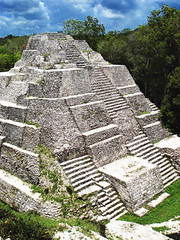 The ongoing collapse of the Stanford financial services empire is global news, but just the latest in a series of high-profile fiascoes in the Latin American banking sector. The Caribbean island of Antigua hosted the headquarters of Stanford, which had operations across Latin America: in Colombia (suspended), Peru (suspended) Ecuador (seized), Panama (taken over), Mexico (investigated), Venezuela (seized), and Miami (raided). Venezuela was hardest hit, with an estimated $2.5 billion invested in Stanford banks and investments, because the company spread aggressively across a country neglected by most international firms given the poor investment climate.
The ongoing collapse of the Stanford financial services empire is global news, but just the latest in a series of high-profile fiascoes in the Latin American banking sector. The Caribbean island of Antigua hosted the headquarters of Stanford, which had operations across Latin America: in Colombia (suspended), Peru (suspended) Ecuador (seized), Panama (taken over), Mexico (investigated), Venezuela (seized), and Miami (raided). Venezuela was hardest hit, with an estimated $2.5 billion invested in Stanford banks and investments, because the company spread aggressively across a country neglected by most international firms given the poor investment climate.Many have noted the similarities between the Stanford and Madoff frauds, but few have noted the Latin America connection. This writer even calls Stanford "the Madoff scandal done Latin American style," ignoring the impact of the Madoff case in the region, where thousands of investors lost several billion dollars, largely through Banco Santander and the Fairfield Greenwich Group. This is largely because wealthy investors in Brazil, Colombia, and Mexico largely stayed quiet about their losses in the Madoff collapse, out of embarrassment and a fear of exposure to extortion and other financial crimes.
Of course, the Madoff scandal was the high-end version of the related "pirámides" and DMG frauds Colombia, which lured in millions of small-scale, often peasant, clients. Several classic Ponzi schemes collapsed simultaneously as the Colombian government cracked down, wiping out the life savings of millions. DMG was the most prominent of the scams, promising and delivering exorbitant interest rates by laundering billions in cocaine profits from the country's biggest cartels.
So, are Latin Americans just gullible? Financial literacy is a problem in the region, but Madoff and Stanford pulled the wool over the eyes of savvy investors around the world. The real problem is a combination of lack of regulation and poor domestic banking sectors. The SEC obviously dropped the ball on Madoff and Stanford, and the Colombian sat on their hands while the pyramids were constructed across Colombia. Without accessible and secure banking options at home, the poor are pushed into fly-by-night operations like DMG and the rich send their money to murky overseas funds.
While the losses are tragic, if the recent scams inspire an effort towards basic financial education, expanding access to banking, and economic transparency, they won't have been a total loss. While it may be warranted in this case, the news of Ecuador and Venezuela seizing Stanford banks indicates that in the short term, however, these frauds are more likely to be used as justification to nationalize banks and erect barriers to international finance.
(Photo from Whirling Phoenix's photostream)



1 comment:
It's amazing the damage that the Standord case have done to a large number of people, savings and dreams compromised now.
There is a web site www.sibfraud.com used by some of the victims to stay updated and share information.
Post a Comment